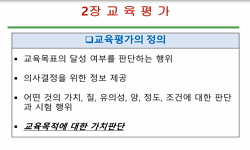This study explores the approaches and challenges of high school English teachers in South Korea in student assessments. Emphasis is placed on their implementation of restricted- and extended-response essay items, as well as performance assessments. W...
http://chineseinput.net/에서 pinyin(병음)방식으로 중국어를 변환할 수 있습니다.
변환된 중국어를 복사하여 사용하시면 됩니다.
- 中文 을 입력하시려면 zhongwen을 입력하시고 space를누르시면됩니다.
- 北京 을 입력하시려면 beijing을 입력하시고 space를 누르시면 됩니다.

한국 고등학교 영어 수행평가와 서·논술형 평가 실태 및 개선 방안 연구 = Investigating performance and essay assessment practices in Korean high schools: Current state and improvement strategies.
한글로보기https://www.riss.kr/link?id=A108893559
- 저자
- 발행기관
- 학술지명
- 권호사항
-
발행연도
2023
-
작성언어
-
- 주제어
-
KDC
740
-
등재정보
KCI등재
-
자료형태
학술저널
-
수록면
115-137(23쪽)
- DOI식별코드
- 제공처
-
0
상세조회 -
0
다운로드
부가정보
다국어 초록 (Multilingual Abstract)
This study explores the approaches and challenges of high school English teachers in South Korea in student assessments. Emphasis is placed on their implementation of restricted- and extended-response essay items, as well as performance assessments. We conducted a survey of 10 high school English teachers, selected through purposeful and snowball sampling methods, using open-ended questions. Results indicate a preference for written tests, predominantly multiple-choice questions, over performance assessments. The study also exposes a discrepancy between the intended and actual implementation of performance assessments, which frequently fall short in adequately evaluating students' English productive skills, specifically speaking and writing abilities. Teachers face challenges in collaborating with colleagues, grading, and offering meaningful feedback, often constrained by time and students' focus on scores. The research underscores the necessity for professional development in language assessment literacy, particularly in the creation of scoring rubrics and the application of consistent grading methods for performance, restricted- and extended-response essay assessments. These improvements are aimed at closing the gap between assessment objectives and actual practices, ensuring a more effective contribution to the development of students' English language proficiency.
목차 (Table of Contents)
- Ⅰ. 서론
- Ⅱ. 이론적 배경
- Ⅲ. 연구방법
- Ⅳ. 결과 및 논의
- Ⅴ. 결론 및 제언
- Ⅰ. 서론
- Ⅱ. 이론적 배경
- Ⅲ. 연구방법
- Ⅳ. 결과 및 논의
- Ⅴ. 결론 및 제언
- 참고문헌
동일학술지(권/호) 다른 논문
-
Applicability of Fine-Tuned ChatGPT to Automated Essay Scoring
- 한국영어평가학회
- Yongkook Won
- 2023
- KCI등재
-
- 한국영어평가학회
- 최원경(Wonkyung Choi)
- 2023
- KCI등재
-
Construct Validity of the Constructed Response Test Tasks in School-Based Assessment
- 한국영어평가학회
- 김수명(Soomyoung Kim)
- 2023
- KCI등재
-
AI 펭톡 연계 초등영어 수업과 평가의 설계와 적용에 관한 연구
- 한국영어평가학회
- 김민제(MinJe Kim)
- 2023
- KCI등재




 KCI
KCI 스콜라
스콜라



